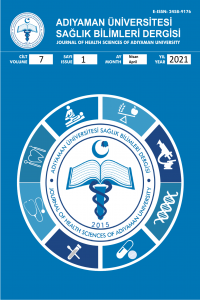Çocuklarda Vezikoüreteral Reflü Tanısında Floroskopik Voiding Sistoüretrografi ile Voiding Ürosonografinin Karşılaştırılması
sistoüretrogram, ürosonografi, Vezikoüreteral reflü, voiding
Comparison of Fluoroscopic Voiding Cystourethrography and Voiding Urosonography in the Diagnosis of Vesicoureteral Reflux in Children
___
- 1. Wallace DMA, Rothwell DL, Williams DI: The long term follow up of surgically treated vesicoureteral reflux. Br J Urol 1978; 50:479-84.
- 2. Burger RH, Smith C: Hereditary and familial vesicoureteral reflux. J Urol 1971; 106:845-51.
- 3. Ransley PG: Vesicoureteric reflux: Continuing surgical dilemma. Urology 1978; 12:246-55.
- 4. Jacobson SH, Eklof O, Eriksson CG, Lins LE, Tidgren B, Winberg J: Development of hypertension and uraemia after pyelonephritis in childhood: 27 year follow up. Br Med J 1989; 299:703-6.
- 5. Vallee JP, Vallee PD, Greenfield SP, Wan J, Springate J: Contemporary incidence of morbidity related to vesicoureteral reflux. Urology 1999; 53:812-5.
- 6. Sheldon CA, Wacksman J: Vesicoureteral reflux. Pediatr Rev 1995; 16:22-7.
- 7. Mentzel HJ, Vogt S, Patzer L, et al: Contrast-enhanced sonography of vesicoureterorenal reflux in children: Preliminary results. AJR Am J Roentgenol 1999; 173:737-40.
- 8. Report of the International Reflux Study Committee: Medical versus surgical treatment of primary vesicoureteral reflux. Pediatrics, 1981; 67:392-400.
- 9. Kaefer M, Curran M, Treves ST, et al: Sibling vesicoureteral reflux in multiple gestation births. Pediatrics 2000; 105:800-4.
- 10. Rollestone GL, Shannon FT, Utley WLF: Follow up of vesico-ureteric reflux in the newborn. Kidney Int 1975; 8:59-64.
- 11. Yıldırım İ, Dayanç M: Vezikoüreteral reflü. In: Güncel Çocuk Ürolojisi (Dayanç M, ed.). Bölüm 8. Ankara: Atlas Kitapçılık, 2004: 145-88.
- 12. Goldraich NP, Goldraich IH: Follow up of conservatively treated children with high and low grade vesicoureteral reflux: A prospective study. J. Urol 1992; 148:1688-92.
- 13. İşlek İ: Çocukluk yaş grubu kronik böbrek yetmezliğinde etyolojik faktörler. Ondokuz Mayıs Üniversitesi Tıp Fakültesi Dergisi 1995; 12:113-20.
- 14. Şirin A, Emre S, Alpay H, Nayır A, Bilge İ, Tanman F: Etiology of chronic renal failure in Turkish children. Pediatr Nephrol 1995; 9:549-52.
- 15. Van den Abbeele AD, Treves ST, Lebowitz RL, et al: Vesicoureteral reflux in asymptomatic siblings of patient with known reflux: Radionuclide cystography. Pediatrics 1987; 79:147-53.
- 16. Sparrow MM. Nephrology. In: The Harriet Lane Handbook (Gunn VL, Nechyba C, ed), 16 th ed. Chapter 18.London: Mosby, 2002: 397-416.
- 17. Hodson CJ, Maling TMJ, McManamon PJ, Lewis MG: The pathogenesis of reflux nephropathy (chronic atrophic pyelonephritis). Br J Radiol Suppl 1975; 13:1-26.
- 18. Kaude JV, Lorenz E, Reed JM: Gonad dose to children in voiding urethrocystography performed with 70 mm image intensifier fluorography. Radiology 1969; 92:771-74.
- 19. Zhang W, Cai B, Zhang X, Zhou J, Qiu L, Yi H. Contrast-enhanced voiding urosonography with intravesical administration of ultrasound contrast agent for the diagnosis of pediatric vesicoureteral reflux. Exp Ther Med. 2018 Dec;16(6):4546-52
- 20. Chua ME, Kim JK, Mendoza JS, Fernandez N, Ming JM, Marson A, Lorenzo AJ, Lopes RI, Takahashi MS. The evaluation of vesicoureteral reflux among children using contrast-enhanced ultrasound: a literature review. J Pediatr Urol. 2019 Feb;15(1):12-17.
- Yayın Aralığı: 3
- Başlangıç: 2015
- Yayıncı: ADIYAMAN ÜNİVERSİTESİ
Selçuk UZUNER, Gönül AYDOĞAN, Sebuh KURUOĞLU, Pınar TURHAN
Saliha Ayşenur ÇAM, Seyfullah Oktay ARSLAN
Is there any association between ABO blood types and slow coronary flow?
Acil hekimlerinin ve radyoloji uzmanlarının abdomen BT yorumlama düzeylerinin karşılaştırılması
Vernal Keratokonjonktivit Hastalarında Kırmızı Hücre Dağılım Genişliğinin Değerlendirilmesi
Metal para yutma sonrası gelişen özofagus perforasyonu ve şilotoraksın tedavisi
Analysis of Deaths Related to Synthetic Cannabinoid (“Bonsai”) in Eskişehir, Turkey
İşılay BALCI, Ali YILMAZ, Yeşim YETİŞ, Emrah EMİRAL, Kenan KARBEYAZ
Çocuklarda Kronik Otitis Media için Sosyodemografik, Sosyoekonomik ve Klinik Risk Faktörleri
Ercan KURT, Fatih ÇELENK, Burhanetin GÖNÜLDAŞ, Koray TÜMÜKLÜ
Ali ŞİMŞEK, Lokman BALYEN, Müslüm TOPTAN, Ayhan SAĞLAR, Ali Asgar YETKİN
